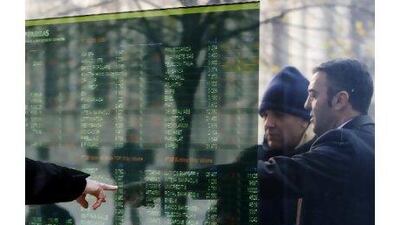Middle East markets will look outwards to Europe and inwards at the region this week as the euro-zone debt crisis and a series of property-related court cases in Egypt influence trading.
Finance:
Industry Insights Exclusives you can bank on from The National's premium content. Learn More
Investors will be eyeing the euro- zone's borrowing costs and hoping that after the 7.02 per cent yield reached by Italian 10-year bonds last week, other countries do not breach the 7 per cent threshold that prompted bailouts for Ireland and Portugal.
"Right now, we are monitoring global markets and hoping they don't breach their levels because if they do, we might be seeing another major sell-off," said Haissam Arabi, the chief executive and fund manager at Gulfmena Investments.
The yields on bonds of countries from Portugal to Finland, and from the Netherlands to Austria, rose relative to Germany, triggering a roller-coaster ride for global markets last week.
In Egypt, the second-largest bourse in the Middle East is expected to experience heightened volatility this week as legal disputes over Egyptian property acquired by developers resume on Tuesday. The cases revolve around a 1998 law requiring state land to be sold via competitive bidding, rather than by non-competitive sales.
Egypt's EGX 30 Index declined 1.1 per cent on Thursday to 4,124.71, its lowest level in five weeks. The measure fell 5.9 per cent for the week.
Talaat Moustafa Group (TMG) is expected to attend a court hearing on whether Egypt's biggest publicly listed developer will be allowed to keep a 3,300-hectare plot on the outskirts of Cairo. TMG's US$3 billion Madinaty project, which makes up a bulk of its land bank, has been tied up in a land dispute since September last year, when a court upheld a ruling that scrapped the sale of state land to TMG because the property had not been auctioned.
Palm Hills Developments will attend a court case contesting the legality of its purchases of state land from the government to develop its Palm Parks project, which is 50 per cent complete. Yasseen Mansour, the chairman of Palm Hills, was acquitted of graft charges in July.
Amer Group, Dubai's Damac Properties and Qatari Diar are also expected to attend separate court cases on Tuesday regarding the annulment of land allocations.
In September, a court withdrew steel production licences from three companies, including Egypt's biggest publicly traded manufacturer of the metal, Ezz Steel, whose former chairman, Ahmed Ezz, was sentenced to 10 years in prison for irregularities in obtaining the licences from the government of Hosni Mubarak, who was forced from the presidency in February by popular protests.
"There are way too many unknowns at the moment," said Saleem Khokhar, the head of equities at National Bank of Abu Dhabi. "Egypt is a market that has a lot of potential, but that won't be unlocked until a year or so."
In Kuwait, investors will be eyeing political security in the country after numerous strikes and protests over the past two weeks. On Thursday, protesters muscled their way into Kuwait's parliament building, entering the chamber and overpowering guards, while hundreds of others rallied outside, demanding the resignation of the prime minister, Sheikh Nasser Al Mohammed Al Ahmed Al Sabah. Kuwait's emir asked to meet the government later on Thursday, which analysts say will dictate market sentiment this week.
"Kuwait is made up mainly of local investors, and if you're going to have political problems, you'll see a sell-off," a trader based in Kuwait said on condition of anonymity. "We had more liquidity earlier [in the] week, but it's all gone away. Nothing today matters except the politics."
In the UAE, the markets' focus will remain on the posture of index compiler the MSCI. Last week, the MSCI dropped Aldar Properties and Sorouh Real Estate, two of Abu Dhabi's most actively traded stocks, from its UAE Frontier Market Index.The Abu Dhabi Securities Exchange General Index lost 0.7 per cent last week, ending its trading week on Thursday at 2,473.57.The Dubai Financial Market General Index lost 0.9 per cent for the week to close at 1,379.05 on Thursday.The UAE is under review for a potential MSCI upgrade to "emerging-market" status. MSCI currently lists the country as a "frontier market". A decision is expected next month.
Last week, Qatar's QE Index added 0.4 per cent to close at 8,743.86, Oman's MSM 30 Index fell 0.8 per cent to 5,521.17, and Bahrain's index jumped 1.2 per cent to 1,168.30. The Saudi Tadawul All-Share Index declined 0.7 per cent to 6,198.87 yesterday.

